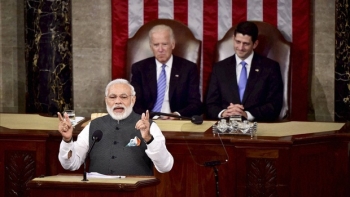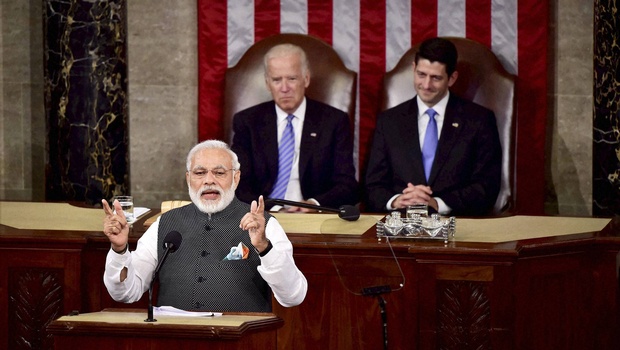
.png) Jacob Peenikaparambil
Jacob Peenikaparambil

Prime Minister Narendra Modi’s state visit to the US was celebrated with pomp and show by the mainstream media in India. Modi as part of his address to the US Congress extolled democracy in the following words: “Democracy is one of our sacred and shared values. It has evolved over a long time, and taken various forms and systems. Throughout history, however, one thing has been clear. Democracy is the spirit that supports equality and dignity. Democracy is the idea that welcomes debate and discourse. Democracy is the culture that gives wings to thought and ex
Modi, who had stoutly refused any press conference during the last eight years, was forced in a way to hold a joint press conference with US President Joe Biden at the end of his state visit on condition that he would take only one question each from an Indian and an American reporter. The idea of democracy and issue of discrimination against Muslims appeared in the question that was put to him during the press conference.
The Wall Street Journal’s White House correspondent Sabrina Siddiqui was given the opportunity to ask a question to Modi. “India has long prided itself as the world’s largest democracy, but there are many human rights groups who say that your government has discriminated against religious minorities and sought to silence its critics. What steps are you and your government willing to take to improve the rights of Muslims and other minorities in your country and to uphold free speech?” she asked.
Modi replied merrily that there was no discrimination in India based on identity. “We have always proved that democracy can deliver. And when I say deliver, this is regardless of caste, creed, religion, gender. There’s absolutely no space for discrimination. And when you talk of democracy, if there are no human values and there is no humanity, there are no human rights, then it’s not a democracy,” he said.
Responding to the statement of Modi, Arfa Khanum Sherwani wrote an article in The Wire under the title, “Modi’s White Lie in the White House”. She has narrated in her article various kinds of violations of human rights of Muslims and discrimination against them, including discriminatory laws passed by the Modi government, in order to prove what Modi told in the press conference was contrary to the facts. The Prime Minister’s devotees may praise him for giving a theoretical answer without touching the core issue. In fact, Modi was skilfully avoiding the real answer.
Anyone, who has followed the political developments in India since 2014, can easily grasp that the country has drifted away from the democratic and Indian constitutional values and principles. Christophe Jaffrelot in his highly researched book, “Modi’s India”, has narrated with concrete examples how democratic institutions have been systematically weakened ever since Modi came to power. At the end of the book, he writes that India has become an “electoral autocracy”.
A UN Resolution adopted in 2004 has highlighted seven essential aspects of democracy as follows.
1) Separation and balance of power
2) Independence of judiciary
3) A pluralist system of political parties and organizations
4) Respect for rule of law
5) Accountability and transparency
6) Free, independent and pluralist media
7) Respect for human and political rights: freedom of association and ex
On all these parameters Indian democracy has slipped downhill. Ever since Modi became the Prime Minister the balance among the three pillars of democracy tilted in favour of the executive. Since the BJP has a brute majority in the Lok Sabha, laws are passed without much discussion and without referring to the parliamentary committees for detailed study. Examples are Citizenship Amendment Act, Abrogation of Article 370 and the three controversial farm laws which were later withdrawn. Thus, Parliament has become a rubber stamp under the Modi regime.
Erosion in the independence of the judiciary is reflected in the inordinate delay in taking up very important constitutional cases like Electoral Bonds, CAA and Abrogation of Article 370. The clash between the government and the judiciary with regard to the appointment of judges to the Supreme Court and the High Courts is the result of the government putting pressure on the judiciary to appoint its favoured candidates to the judicial posts. Some of the judgments of the Supreme Court like Ayodhya Ram Mandir, indicate the judiciary tilting towards the executive.
The failure of the BJP governments to take action against the Hindutva organizations that are involved in lynching, hate speech against minorities and attacks on churches shows that the laws are not evenly applied to all. In December 2021, a large gathering of Hindu religious leaders, hardline fundamentalist individuals and members of Hindutva organisations was held at Haridwar what was called ‘Dharma Sansad’. A series of hate speeches against Muslims, including a call for genocide of Muslims, were delivered during the three-day event. Unfortunately, most of these hate speakers continue to spew the venom of hatred with impunity.
There is blatant discrimination against the minorities in the application of laws in the BJP ruled states. Houses, shops and other establishments of Muslims are bulldozed by the administration when cases are filed against them. The government becoming the prosecutor and judge is a blatant violation of the rule of law. The investigation agencies like ED and CBI are liberally used against the opposition leaders. When any opposition leader joins the BJP, cases filed against him are put in the cold storage so much so the opposition parties have compared this discriminatory policy to a washing machine.
Asking questions to the government and getting answers from the ministers and the ruling party in the Parliament is one of the effective means to make the government accountable and transparent. But the BJP government at the centre through the Speaker often doesn’t allow the opposition parties to raise relevant issues. This often leads to stalemate in the two Houses of the Parliament. For example, the Speaker of the Lok Sabha did not allow a discussion on the Adani Hindenburg issue which is very vital to the health of the Indian economy.
Lack of transparency and accountability was reflected in the failure of the government to accept the NSSO’s 2017-18 Periodic Labour Force Survey (PLFS) which showed the unemployment rate (6.1%) reaching a 45-year high (since 1972-73). Instead of analysing the findings and formulating appropriate responses, the government termed it a “draft” and junked it. Similarly, the system of electoral bonds through which companies donate funds to political parties is not at all transparent, as the political parties are not obliged to reveal the names of the donors. The BJP secured 57% of the electoral bonds sold during 2018-12.
An objective and impartial Media is considered to be the fourth pillar of democracy. It is the responsibility of the media to provide people true and authentic information and thereby make the government accountable. If the media becomes a propaganda machine of the government, it will be failing in its duty. Unfortunately, the mainstream media in India, except a few newspapers, have become the supporters and propagandists of the government and the ruling party. When it is asked to bend, it crawls. People have to depend on some online platforms to get real information about what is happening in the country.
The journalists who question the government, expose its failures or depict the reality of people are often harassed and even put in jail under the draconian laws. Siddiqui Kapan, a Kerala-based journalist, was in jail for about two years without trial. He was arrested and put behind bars by the Yogi Adityanath government while he was travelling to Hatras in UP for reporting a rape case. Some of the journalists imprisoned in India are Aasif Sultan, Gautam Navlakha, Manan Dar, Sajad Gul, Fahad Shah and Rupesh and Kumar Singh.
The annual report, released by the US Secretary of State Antony Blinken in 2022, has mentioned human rights violations such as extrajudicial killings, torture or cruel, inhuman, or degrading treatment or punishment by police and prison officials, and harsh and life-threatening prison conditions. Arbitrary arrest and detention of political prisoners, arbitrary or unlawful interference with privacy, restrictions on freedom of ex
A cursory look at the reports by various international agencies that assess the functioning of democracy and status of human rights in different countries of the world reveals where India stands. The V-Dem Institute in its Electoral Democracy Report 2023 has ranked India at the 108th spot globally for electoral democracy.
The U.S. Commission for International Religious Freedom (USCIRF) in its annual report on religious freedom designated India as a “country of particular concern” on the status of religious freedom.
India has been ranked a “partly free” country for the third year in a row in the annual report (Freedom of the World 2023) of Freedom House, a US government-funded non-profit organization. The report has stated that democracy in India is “losing ground”.
Global media watchdog ‘Reporters Without Boarders’ in its latest report on press freedom in countries has assigned the rank 161 out of 180 countries in the World Press Freedom Index 2023. “The situation has gone from ‘problematic’ to ‘very bad’ in three other countries: Tajikistan (down 1 at 153rd), India (down 11 at 161st) and Turkey (down 16 at 165th),” the report said.
The facts about Indian democracy are entirely different from the rosy picture presented by Modi in his address to the American Congress and during his press conference. The BJP and the Prime Minister have to realize that in a highly interconnected world through information communication technology facts cannot be hidden.